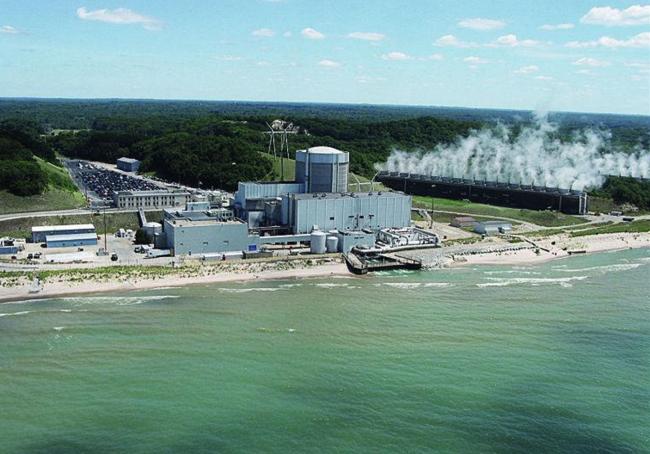Articles Menu

Sept. 30, 2024
The Energy Department said on Monday that it had finalized a $1.52 billion loan guarantee to help a company restart a shuttered nuclear plant in Michigan — the latest sign of rising government support for nuclear power.
Two rural electricity providers that planned to buy power from the reactor would also receive $1.3 billion in federal grants under a program approved by Congress to help rural communities tackle climate change.
The moves will help Holtec International reopen the Palisades nuclear plant in Covert Township, Mich., which ceased operating in 2022. The company plans to inspect and refurbish the plant’s reactor and seek regulatory approval to restart the plant by October 2025.
After years of stagnation, America’s nuclear industry is seeing a resurgence of interest. Both Congress and the Biden administration have offered billions of dollars in subsidies to prevent older nuclear plants from closing and to build new reactors. Despite concerns about high costs and hazardous waste, nuclear plants can generate electricity at all hours without emitting the greenhouse gases that are heating the planet.
David Turk, the deputy secretary of energy, said he expected U.S. electricity demand would grow by 15 percent over the next few years, driven by an increase in electric vehicles, a boom in battery and solar factories as well as a surge of new data centers for artificial intelligence. That meant the nation needs new low-carbon sources of power that could run 24/7 and complement wind and solar plants.
“It’s been incredible to see nuclear power become part of that conversation in a way that just wasn’t happening before,” Mr. Turk said.
Holtec acquired the Palisades nuclear plant in 2022, with plans to dismantle it, but later campaigned to reopen the plant with the backing of Gov. Gretchen Whitmer of Michigan, a Democrat.
No company has ever revived a U.S. reactor that was seemingly closed for good. That could soon change.
In Pennsylvania, Constellation Energy Corporation recently announced that it planned to restart the dormant Three Mile Island nuclear plant by 2027, after striking a deal to sell electricity to Microsoft, which needs power for its fast-growing fleet of data centers. Three Mile Island was the site of the worst nuclear accident in U.S. history when one of the plant’s two reactors partly melted down in 1979. The other, undamaged reactor closed five years ago for economic reasons.
It’s not easy to reopen a nuclear plant that has been mothballed for years. Workers have to check for corrosion and decay and replace old turbines and other parts. A restart needs approval from the Nuclear Regulatory Commission, which oversees reactor safety.
Holtec has already faced hurdles: Earlier this month, federal regulators said a “large number of steam generator tubes” at Palisades required further inspection and potential repair. Patrick O’Brien, a spokesman for Holtec, said the company expected complications to arise and still aimed to reopen the plant next year.
The Michigan chapter of the Sierra Club has called the effort to reopen Palisades “foolhardy and costly” and said it would be faster and cheaper to build renewable sources like wind and solar.
Yet many see the plant as indispensable. Two nonprofit electricity providers have signed long-term deals to buy power from Palisades, which has 800 megawatts of electric capacity, roughly enough to power 700,000 homes.
That includes Wolverine Power Cooperative, which serves 280,000 rural homes and businesses in Western Michigan. Wolverine is aiming to eliminate its carbon dioxide emissions by 2030, a decade earlier than Michigan’s statewide goal, and says it needs nuclear power to backstop its wind and solar farms.
“The restart of Palisades offers a practical, long-term solution to electric reliability in our state,” said Eric Baker, Wolverine’s chief executive.
The Agriculture Department said it would provide a $650 million grant to Wolverine to help defray one-quarter of the costs of that purchase agreement. The agency would also provide $675 million to Hoosier Energy, a nonprofit electricity provider in Indiana and Illinois that plans to buy power from Palisades. The funds would also help Hoosier build two solar plants.
“Even as rural people grow our food, our fiber and our fuel, they end up having to pay more for the electricity it takes to do so, and this is just one of the ways we’re working to address that challenge,” said Xochitl Torres Small, the deputy secretary of agriculture.
Only one other dormant nuclear plant in the United States could plausibly be restarted: the Duane Arnold plant in Iowa. Other reactors that have recently shut down are already being dismantled.
Some companies hope to build a new generation of nuclear plants, though that is expected to be much more expensive and time-consuming than restarting shuttered plants. One advanced reactor backed by Bill Gates is currently under construction in Wyoming, and Holtec has suggested that it could build two small reactors at the Palisades site in the 2030s.
The Energy Department, which was given billions of dollars by Congress to finance new energy projects, said it was reviewing $65 billion in loan requests from companies looking to build reactors. None have been approved yet.
[Top photo: The Palisades nuclear plant in Michigan will reportedly be awarded a $1.5 billion federal loan, aimed at restarting operations after a 2022 closure. The federal funding could bolster state efforts to keep nuclear power on the grid, as leaders seek to transition to carbon-free electricity (Courtesy of The Herald-Palladium).]